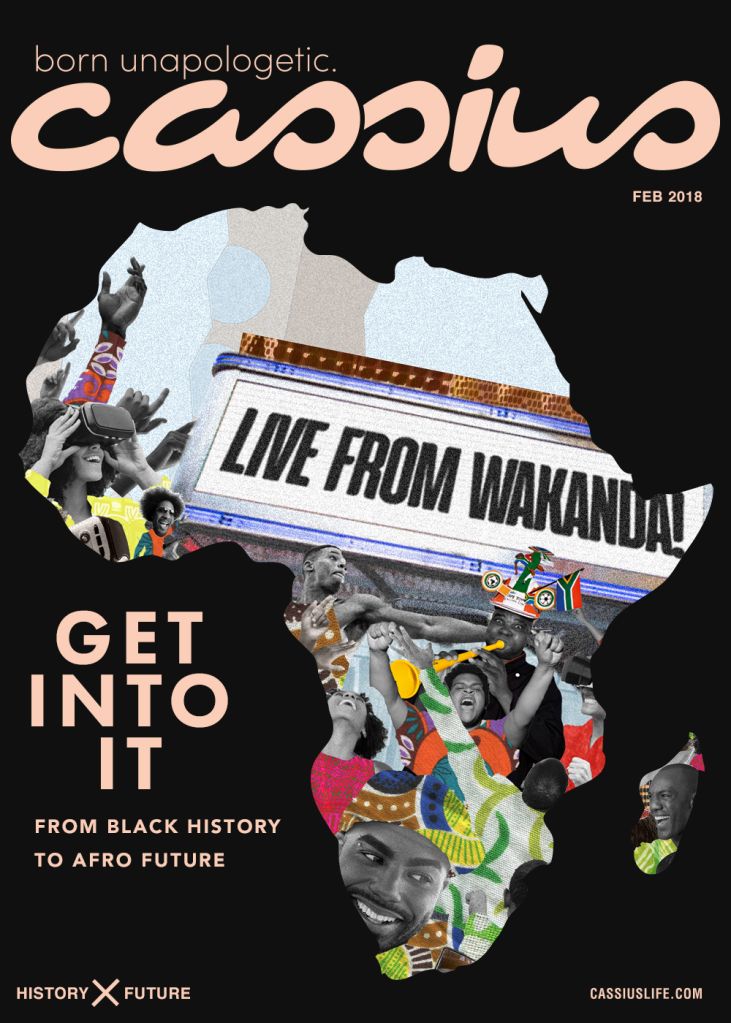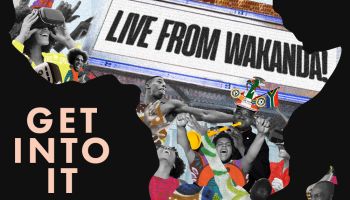
Source: iOne Creative, Aaron Amado, Dave Giles II for Gsc.nyc
Bingeing on Barack Obama feels like a salve to the soul these days. Black folks’ eternal acting president radiated his signature charm and intellect recently as the first guest on David Letterman’s new Netflix talk show, My Next Guest Needs No Introduction. HBO’s documentary The Final Year, exploring Obama’s last 12 months in office, reminds us all about the dignity and competence he brought to his terms in the White House compared to what’s happened in Washington D.C. since. Our hive-mind hunger for Obama and his levels of Black excellence, Black cool, Black badass-ness is a major reason why anticipation for Black Panther runs through the roof right now. Black Panther is that Black balm for the spirit.
Peak Black excellence turning us all the way out on such a highly visible stage connects Black Panther with those earliest days of Obama optimism, that hypeness of “we just overcame.” Experiencing the first major Black African superhero at the center of a Hollywood tentpole event feels like Inauguration Day 2009 all over again, and we’re here for all of it.
The African-American mantra “twice as good” (Blacks have to be twice as good as whites to get half as much) applies to everything in this culture, even superheroes. Black Panther—with its nearly all-Black, all-star cast and Black director Ryan Coogler—set a record in January for the highest first-day advance ticket sales of any Marvel Studios movie ever, all 18 of them. Just like Luke Cage broke the internet by overloading Netflix’s servers in 2016, Black Panther definitely satisfies that well-known “twice as good” mantra. Our peoples are hitting open-day weekend hard, buying tickets even if they can’t physically put their butts in a theater seat, launching campaigns to send inner-city kids to see themselves rendered as superheroic in a mythological, hyper-technological African nation. We’re all collectively primed for this major moment of mainstream Afrofuturism, and it’s been a long time coming.
Because Black Panther is not a sidekick superhero like the Falcon (Anthony Mackie) from Captain America: The Winter Solider or War Machine (Don Cheadle) from Iron Man 2. Black Panther is royalty, king of the technologically superior African nation of Wakanda. And Wakanda, which has never been colonized by Europe, puts Silicon Valley to shame in the heart of the Motherland with hyper-advanced science way beyond that of the western world. Black Panther also kills dead the damsel-in-distress comic book trope from back in the day (R.I.P. Lois Lane): the bold, bald Dora Milaje special forces of all-female warriors is on par with Black Panther himself.
‘Black Panther’ also kills dead the damsel-in-distress comic book trope from back in the day
As an inter-generational, global moment for the diaspora, Black Panther resonates like Star Wars for people of color. Not Star Wars: The Last Jedi, but 1977’s original Star Wars, the one that helped usher in the blockbuster with lines around the block and cineastes seeing it again and again. That intergalactic space opera swelled into the highest grossing film of all time for years based on folks’ repeated viewings and kids’ addiction to the tie-in toys. You had to see it, and has Black America ever had a comparable movie moment? We do now. Social media overflows with fans planning to posse up for screenings, #BlackPantherSoLit memes about opening day outfits and countdown gifs to February 16. This Afrofuturist action-adventure has event written all over it, and diversity averse Hollywood is in for a big surprise this month. Smart money says Black Panther outgrosses Solo, the next installment in that other never-ending Disney franchise due May 25. What this all means is a franchise damn-near based on African superiority is about to become one of the year’s biggest hits. This isn’t Roots or anything else rooted in black traumatic suffering porn. This is something we’ve never seen.
A franchise damn-near based on African superiority is about to become one of the year’s biggest hits
“It occurred to me that there weren’t any Black heroes,” comic-creating icon Stan Lee once told me. “I said to myself, ‘We ought to have a Black hero.’ In this business they’re always trying to think of something new to come up with. I thought that would be new and it would be fun to do, so we did it.” And so in July 1966, Marvel Comics introduced Black Panther in the pages of Fantastic Four #52. (The character actually predated Oakland’s Black Panther Party for Self-Defense by several months.) In the millennial era, writers Reggie Hudlin (director of Marshall and the classic Boomerang), cultural critic Ta-Nehisi Coates and feminist essayist Roxane Gay have all penned Black Panther stories for Marvel.
With the gargantuan success of the Marvel Cinematic Universe, it’s become cliché to liken the superhero-movie genre to the Westerns of the racist John Wayne days. Superheroes are actually homegrown American mythology, and Black Panther is a potentially paradigm-shifting work of Black cultural art. Just aesthetically, actors Chadwick Boseman, Lupita Nyong’o, Michael B. Jordan, Daniel Kaluuya, Danai Gurira, Forest Whitaker and Angela Bassett all represent the wide-ranging diversity of our skin tones. Visuals matter. It’s practically subversive that an African king battles a European invader bent on exploiting his nation’s precious resources in a $200 million Hollywood blockbuster. There’s layers to this that even Stan Lee in his innocent infinite wisdom couldn’t have foreseen.
The week kicked off with artist Kehinde Wiley unveiling his portrait of Barack Obama to hang in Washington D.C.’s National Public Gallery until kingdom come, an image destined for T-shirt silkscreens, church fans and whatever other maximum blackness iterations our people can come up with. Black Panther will rule the weekend and, likely, the entire rest of Black History Month, casting this February in a triple-stage darkness as authentic as it is unapologetic. Wakanda forever.
















